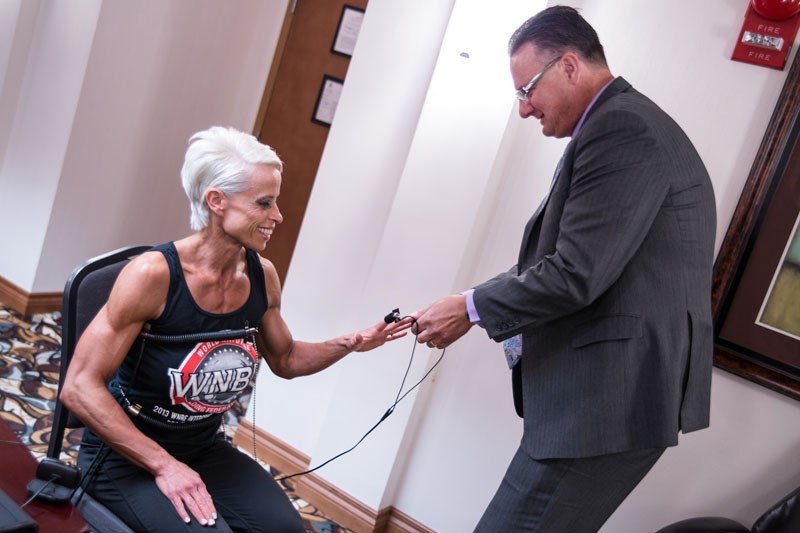When 100 bodybuilders flexed and posed on stage last week at the Telus Spark Centre in Calgary, Ken Donaldson was on the judge's panel, looking to see which one had the best body.
Just a few hours before, though, he was testing them on something they couldn't work on in the gym: their ability to tell the truth.
Donaldson is the co-owner and forensic psychophysiologist with St. Albert's ITR Polygraph Service. Since 2008, he's been working with the International Natural Bodybuilding and Fitness (INBF) Federation to screen their athletes for drug use using a lie-detector.
"A urine test can only tell you what's in their bodies today," Donaldson says, and the INBF's rules require you to be free of some drugs for seven years.
"That's where I come in."
Donaldson says he's one of the few private professional polygraph examiners in Alberta. He started his business in St. Albert back in 2002, and now has a second outlet in Abbotsford, B.C.
"After 9/11, I noticed pre-employment polygraph screening became a huge business in the United States," he says, when asked how he got started.
Donaldson got his polygraph training from the Academy of Polygraph Science in Florida, which offers the same training that's given to police officers in Canada.
He now regularly gives polygraph tests to help people find the truth behind insurance, employment, criminal and domestic disputes. He's also produced a 13-episode documentary called The Lie Detective based on his work.
Donaldson says he deals with everyone from possible wife-cheaters to accused criminals in his line of work.
"Every day is an adventure."
Sometimes he even gets to help restore a person's reputation, like the time he helped a man prove that he did not steal lumber from his former employer. "I just want my family to know I didn't do this horrible thing," the man told him.
"Those are the stories I love."
Drugs, muscles and truth
Drug use is rampant in the bodybuilding industry, says Matthew Park, president of INBF Canada. In order to put on drug-free, all-natural shows, he needs to thoroughly test his performers for a long list of banned substances, including anabolic steroids, clenbuterol and insulin.
Donaldson spent about five days testing about 100 performers just prior to the May 31 event in Calgary.
To test an athlete, he straps several sensors to the chest and fingers of an athlete to track his or her breathing, blood pressure, heart rate and galvanic skin response.
He then asks a number of yes or no questions to the athlete. Some are ones that he already knows the answer to ("Are you in Alberta?") – these serve as a baseline for his readings. Others are more specific – "Did you do clenbuterol in the last two years?"
You have to be careful with how you word your questions, he explains. You don't want a long, rambling answer, as that will affect a person's breathing, and you don't want to be too specific, as that could let the person lie by omission.
"If you ask somebody specifically, 'Did you steal that $1,000?' and they only stole $970, they could pass that test."
As he asks his questions, he watches the person's readings on a laptop computer.
"I'm looking for a significant reaction to the stimulus, the question," he says.
Lying generally triggers a spike in a person's heart rate, blood volume or galvanic skin response, Donaldson says. Even if a person looks cool as a cucumber under questioning, if he sees his or her heart rate spike by 60 beats per minute, he's got good cause to suspect they're not telling the truth.
"It's your physiology that gives you away."
The whole process takes about 40 minutes, since he asks each question three times for accuracy.
It's actually easier to do polygraph tests on bodybuilders than other people, Donaldson says.
"These people are in incredibly good shape," he notes, which makes for steady, easy-to-read pulse and breathing rates.
Park praised Donaldson for his professionalism and experience, and says he's helped catch about 10 cheaters at INBF events in the last five years.
"They know when someone is lying."
Does it work?
Polygraphs have been scientifically proven to detect deception, Donaldson says. He cites research by the American Polygraph Association that suggests the tests are about 87 per cent accurate.
A 2003 review of polygraph tests by the National Research Council (which provides independent research for the U.S. government) expressed caution about the technology, noting that some of the responses they measure can be consciously controlled and can be triggered by factors other than lying.
The review concluded that existing estimates of polygraph accuracy were likely exaggerated, but found that the tests could tell truth from lies "at rates well above chance, though well below perfection."




